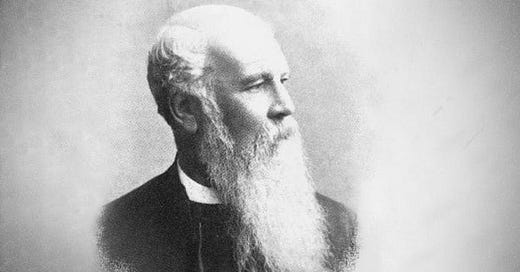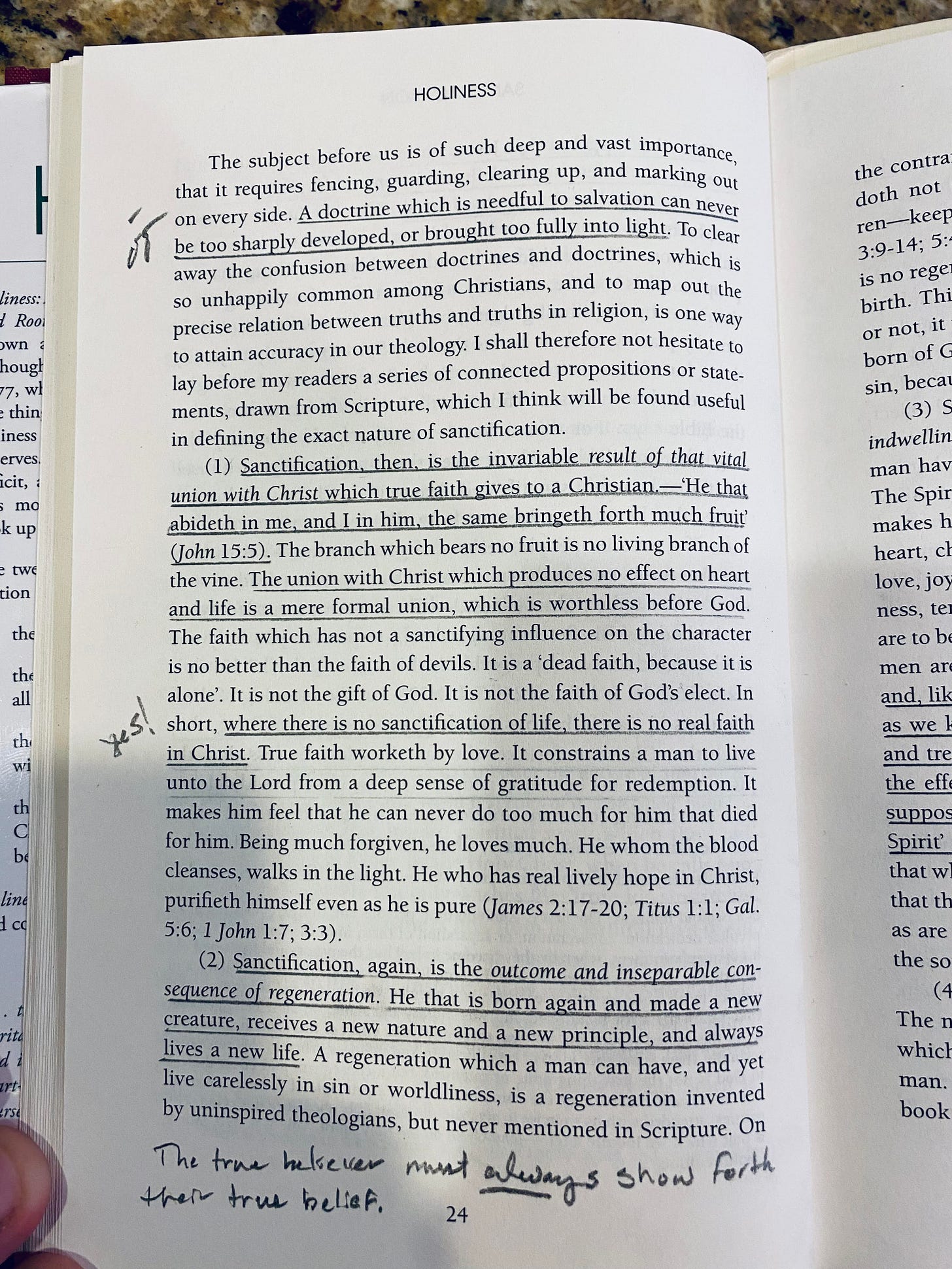Richard Sibbes (1577-1635) was one of the giants of Puritanism in the seventeenth century. He was known for the sweetness of his preaching and his writings, always drawing people’s attention and affections toward the Savior. Martyn Lloyd-Jones once wrote about Sibbes, “I shall never cease to be grateful to…Richard Sibbes who was balm to my soul at a period of my life when I was overworked and badly overtired, and therefore subject in an unusual manner to the onslaughts of the devil.”1 About Sibbes, the “prince of preachers” Charles H. Spurgeon said, “Sibbes never wastes the student’s time. He scatters pearls and diamonds with both hands.”2 It is no wonder then that Sibbes gained the nickname in his time of “sweet dropper”.
I would like to put forth that the Anglican bishop J.C. Ryle (1816–1900) was the 19th Century equivalent of “sweet dropper” in his preaching and in his writings. I always come away from reading Ryle feeling humbled, chastened, comforted, challenged, admonished, refreshed, and drawn nearer to Christ. I am exhorted to dive deeper into the Scriptures and come closer to the shepherd and savior of my soul. I am reminded of the importance of “improving my baptism” and keeping a close watch on my tongue, my temper, and my time. I am encouraged in my vocation of pastor to preach the gospel of Jesus Christ with more boldness and faith. I am astonished that the temptations that befell Christians in Ryle’s age are little changed from ours, although they may come to us through different means.
If you have never read anything by J.C. Ryle, begin with a little book to get a feel for his writing style. Thoughts for Young Men, The Power and Sympathy of Christ, or Warnings to the Churches are all excellent starting places. Ryle is ridiculously easy to read and you should have little trouble. In fact, if you underline, write in, and interact with your books, your copies of Ryle will end up looking like this (my copy of Holiness).
Here are just a few of the “sweet droppings” from the pen of Bishop Ryle. There are literally hundreds more waiting for you to gobble them up.
—
If the Bible is not the Word of God and inspired, the whole of Christendom for 1,800 years has been under an immense delusion—half the human race has been cheated and deceived, and churches are monuments of folly. If the Bible is the Word of God and inspired, all who refuse to believe it are in fearful danger; they are living on the brink of eternal misery. No man, in his sober senses, can fail to see that the whole subject demands most serious attention. Old Paths
Tell me not of your justification, unless you have also some marks of sanctification. Boast not of Christ’s work for you, unless you can show us the Spirit’s work in you. Think not that Christ and the Spirit can never be divided. I doubt not that many believers know these things, but I think it good for us to be put in remembrance of them. Let us prove that we know them by our lives. Let us try to keep in view this text more continually: “Follow holiness, without which no man shall see the Lord.” Holiness
There is one subject which we never hear too much of: we can never hear too much of Christ. When ministers are wearied of preaching Him, they are false ministers: when people are wearied of hearing of Him, their souls are in an unhealthy state. When ministers have preached Him all their lives, the half of His excellence will remain untold. When hearers see Him face to face in the day of His appearing, they will find there was more in Him than their hearts ever conceived. Knots Untied
The love of the bible will show itself in a believer's readiness to bear evil as well as to do good. It will make him patient under provocation, forgiving when injured, meek when unjustly attacked, quiet when slandered. It will make him hear much, put up with much and look over much, submit often and deny himself often, all for the sake of peace. Practical Religion
Let no man ever delude you into supposing that you can be happy in this world without repentance. Oh, no! You may laugh and dance, and go upon vacations, and crack good jokes, and sing good songs, and say, “Cheer, boys, cheer!” and “There’s a good time coming!”—but all this is no proof that you are happy. So long as you do not quarrel with sin, you will never be a truly happy man. Just as an opium-eater needs a larger and larger doses—so does the man who seeks happiness in anything except in God need greater excitement every year that he lives, and after all is never really happy. “Repentance” in Old Paths
Let us never measure our religion by that of others, and think we are doing enough if we have gone beyond our neighbors. Holiness
Tell me what a man does in the matter of Bible-reading and praying, in the matter of Sunday, public worship, and the Lord's Supper, and I will soon tell you what he is, and on which road he is travelling. Practical Religion
Habits are like stones rolling down hill—the further they roll, the faster and more ungovernable is their course. Habits, like trees, are strengthened by age. A boy may bend an oak when it is a sapling—a hundred men cannot root it up, when it is a full grown tree. A child can wade over the Thames River at its fountain-head—the largest ship in the world can float in it when it gets near the sea. So it is with habits: the older the stronger—the longer they have held possession, the harder they will be to cast out. Thoughts for Young Men
For your own soul’s sake dare to make up your mind what you believe, and dare to have positive distinct views of truth and error. Never, never be afraid to hold decided doctrinal opinions. And let no fear of man and no morbid dread of being thought party-spirited, narrow, or controversial, make you rest contented with a bloodless, boneless, tasteless, colourless, lukewarm, undogmatic Christianity. Mark what I say. If you want to do good in these times, you must throw aside indecision, and take up a distinct, sharply-cut, doctrinal religion. If you believe little, those to whom you try to do good will believe nothing. Holiness
Men and brethren, we who preach the Gospel can hold out to all who come to Christ, exceeding great and precious promises. We can offer boldly to you in our Master’s name, the peace of God which passes all understanding. Mercy, free grace, and full salvation, are offered to everyone who will come to Christ, and believe on Him. But we promise you no peace with the world, or with the devil. We warn you, on the contrary, that there must be warfare, so long as you are in the body. We would not keep you back, or deter you from Christ’s service. But we would have you count the cost, and fully understand what Christ’s service entails. Hell is behind you. Heaven is before you. Home lies on the other side of a troubled sea. Thousands, tens of thousands have crossed these stormy waters, and in spite of all opposition, have reached the haven where they would be. Hell has assailed them, but has not prevailed. Go forward, beloved brethren, and fear not the adversary. Only abide in Christ, and the victory is sure. Warnings to the Churches
Shallow, skin-deep feelings in others, we all know continually chill and disappoint us on every side in this world. But there is one whose mighty heart affection knows no bottom. That one is Christ. Expository Thoughts on John, Part 3
Martyn Lloyd-Jones in Richard Sibbes, The Bruised Reed (Edinburgh: Banner of Truth, 2016), x.
Ibid, vii.





